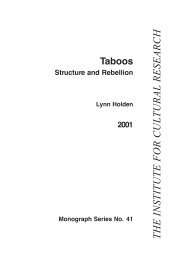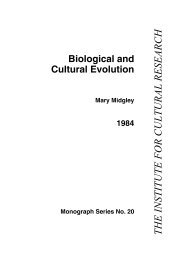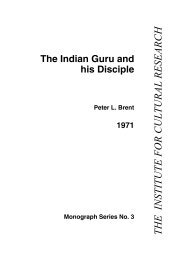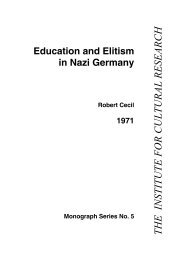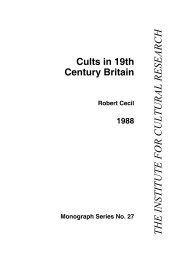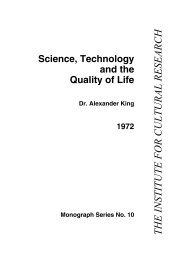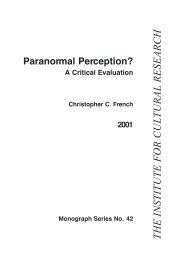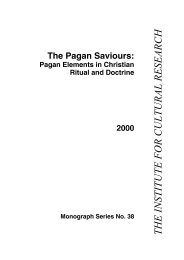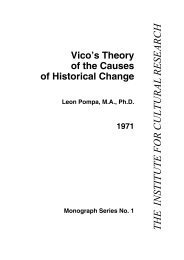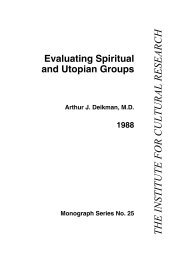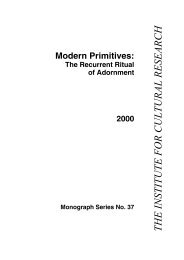Cultural Identity: Solution or Problem - The Institute For Cultural ...
Cultural Identity: Solution or Problem - The Institute For Cultural ...
Cultural Identity: Solution or Problem - The Institute For Cultural ...
Create successful ePaper yourself
Turn your PDF publications into a flip-book with our unique Google optimized e-Paper software.
channelled into p<strong>or</strong>k-barrel politics in which ethnic identity<br />
becomes a meal ticket, a way into government funding; in this<br />
context, it becomes m<strong>or</strong>e divisive. <strong>The</strong> s<strong>or</strong>t of essentialism<br />
practised by Colombian blacks who are involved in the black social<br />
movement in that country is much less pernicious and is linked to<br />
an imp<strong>or</strong>tant challenge to the long-standing tendency which denies<br />
the existence of racism in Colombia and denies the presence of any<br />
African contribution to Colombian culture.<br />
This is no easy answer. As social scientists we have to make<br />
m<strong>or</strong>al decisions about whether we consider the political and<br />
practical effects of particular types of cultural identity strategies to<br />
be good <strong>or</strong> bad. We cannot assume a scientific ‘distance’ and treat<br />
other people as ‘objects’ of study. N<strong>or</strong> indeed will those people<br />
allow that to happen nowadays, as increasingly they demand a say<br />
in the process of being studied, are ever m<strong>or</strong>e capable of assessing<br />
the results of our studies and f<strong>or</strong> that matter, of studying their own<br />
cultures. This means there has to be a dialogue in which the studier<br />
and the studied can talk about the political and practical impact of<br />
particular ways of thinking about and practising identity. Such a<br />
dialogue is not easy, because academics are tied into an institutional<br />
academic context in which the vast maj<strong>or</strong>ity of the production and<br />
distribution of knowledge is still concentrated in Western countries.<br />
<strong>The</strong>re is a basic inequality here which hampers an equal dialogue<br />
and even new communications technologies such as the Internet<br />
can only partially offset these structures of inequality. But things<br />
are changing slowly. Western anthropologists could perhaps take a<br />
leaf from the book of some of their Latin American counterparts.<br />
Anthropologists in Colombia, in my experience, are f<strong>or</strong>ced to be<br />
m<strong>or</strong>e accountable to the people they take as the subject of their<br />
studies, because they live in the same country, w<strong>or</strong>k within the<br />
same political system and speak the same language. Of course,<br />
Colombian anthropologists are still mostly white middle class<br />
urban dwellers, whereas most of their subjects are black and<br />
indigenous peoples who live in rather peripheral rural areas. But<br />
there is necessarily m<strong>or</strong>e communication between them and this<br />
makes judgements about cultural identity easier to root in ethical<br />
practice, rather than the<strong>or</strong>etical purity.<br />
19



